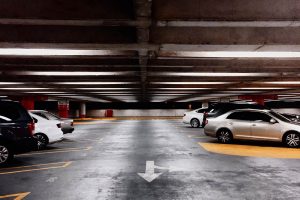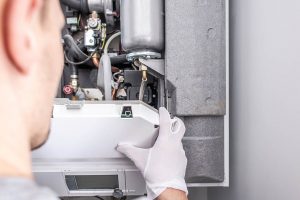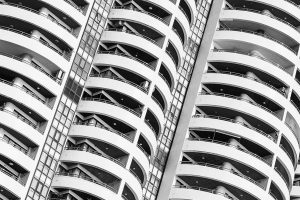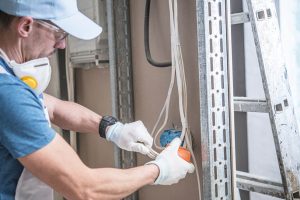Building mechanical systems manage the fresh air supply and distribution, the exhaust systems, heating and cooling, and water distribution and drainage. Garbage systems such as the garbage chute and compactor are also part of the building mechanical systems.
Fresh air is provided to buildings via make-up air units, most often mounted on rooftops. The fresh air enters individual suites from the corridors through the suite doors. It is therefore critical that the suite doors remain unsealed. If unit owners weatherstrip their doors in an attempt to limit odours, this indicates an issue with overall air transfer in the building. This can be resolved by implementing air leakage control measures.
Corridor pressurization is critical to maintaining unit owner health and safety. In the event of a fire, corridor pessurization is nesccessary to keep smoke contained within suites. Balancing the make-up air systems is a critical aspect of good building performance. Ensuring all building exhaust systems, including in-suite exhaust fans, are properly running is also highly critical to maintaining an optimal interior environment.
Garage ventilation must be provided. If there is no carbon monoxide detection systems, then the exhaust fans must run continuously – not on timers! Managing garage ventilation and building pressurization is critical to limiting transfer of exhaust gases from the garage into the building. Uncontrolled leakage from the garage to the building can lead to build-up of carbon monoxide which can have negative impacts on human health.
Most multi-unit buildings utilize water-based heating and cooling systems because it is the most efficient way to generate and distribute that energy. A centralized heating and cooling system distributes energy to each suite through piping networks. That energy is turned into warm or cool air by the fan coil units or heat pumps in each suite.
Boilers create the hot water for both the heating systems and domestic hot water. Boilers can have their life extended and efficiency improved by flame adjustments and burner overhauls. Boilers are most often individually controlled and in residential buildings a central controller is often not required.
Cooling is often provided by cooling towers or chiller units or a combination of the two. Cooling towers use evaporation to eject heat from the building, while chillers use electrical energy to compress gases that provides the cooling energy. Cooling efficiency is maximized through efficient air distribution and by minimizing uncontrolled air leakage.
An important aspect of the long-term maintenance of the mechanical systems is the chemical treatment system. Anti-corrosion and scaling chemicals are added to the heating and cooling fluid and will extend the life of that equipment. Chemical treatment systems that automatically sense and dispense the required chemicals are preferred over treatment by maintenance contractors.
Heating, cooling and plumbing systems are all supported by distribution piping. Piping systems are replaced as needed when repairs to address leaks become significant or when inspection reveals critical information – such as scouring of pipe walls or micro-cracking, in the case of plastic piping systems.
Plastic piping systems such as Kitech are not inherently bad as long as the connections and system temperatures and pressures are properly maintained. Excessive pressure required to maintain pressure in hot water systems will excessively scour distribution piping and reduce its life. If higher pressures are required then system review should be undertaken to identify other optimization opportunities, such as variable pressure pumping.
In a lot of newer buildings shut-off valves or clean-outs are often not installed. Therefore whenever possible during plumbing repairs that require system shutdowns, shut offs and clean-outs should be installed. Clean-out accesses on sanitary sewers are essential to maintaining the proper drainage in the building and limiting the potential for backups that can cause extensive water damage.
From a reserve planning perspective, including equipment overhauls can extend life of certain equipment. This can enable reserve projects that can incorporate ALL mechanical equipment at once. This can have a significant cost savings from a design perspective and can attract better incentives and energy savings by ensuring the integration of all systems. Optimal design, procurement and installation of mechanical systems has a significant impact on a building’s energy consumption and therefore costs. Repair and replacements of major mechanical systems should therefore be performed under the supervision of a professional engineer.







